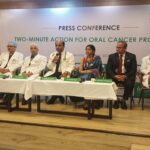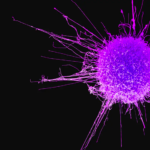Author:Dr Vikram D Kekatpure, Senior Consultant, Head and Neck Oncology, Aster CMI Hospital, Bengaluru
India
healthysoch
New Delhi, February 04, 2022:

Every year since 2000, 4th February is observed as world cancer day to create cancer awareness and encourage its prevention, early detection and treatment. This is an opportunity to renew our commitment to reduce cancer related suffering and deaths. In last few decades, we have made significant progress in our understanding of the cancer biology, standardization of treatment protocol, development of newer diagnostics, innovative drugs, better realization of the survivorship and quality of life issues. One of the main challenges in cancer care is to ensure uniform delivery of care. The treatment tends to gets influenced by availability of resources, both technical and socioeconomic. To address this issue the theme for this year’s world cancer day is ‘close the care gap’.
The covid 19 pandemic has disrupted normal life for more than two years. About 5.5 million people have died due Covid 19 since beginning of pandemic. Compare this to cancer mortality of 10 million deaths every year, which is fairly unnoticed. Even alarming is projection that cancer related deaths would increase to 13 million per year over next few years. In such situation, we need to redouble efforts for cancer awareness, prevention, early detection and innovative therapies. But the real challenge is to deliver a standard of care to everyone and overcome the gaps in the cancer care.
Head and neck cancer or ‘Indian cancer’ (which includes cancer affecting mouth, throat among others) is one of the most common cancers in India with estimated 500,000 new patients being diagnosed every year. These are group of cancers predominantly caused by tobacco smoking or chewing. Since these cancers commonly affect people from lower socio-economic strata the deficiencies in care are glaring.
Gap in awareness:
90% of head and neck cancers are associated with habit of tobacco chewing/smoking. Therefore, primary prevention with effective tobacco control would reduce the number of head and neck cancers drastically. Each one of us should join efforts to create awareness and discourage particularly, the youth from trying tobacco even once.
Cancers detected in early or precancerous stage have a good outcome and treatment protocol are less intense. Unfortunately, in India 80% of the head and neck cancers are diagnosed in advanced stages. These cancers affect vital organs and the symptoms are evident quite early; thereby providing an opportunity for early detection. There is compelling evidence to suggest that opportunistic screening among the high-risk population (tobacco users) helps in early detection and lowers cancer related deaths.
Creating awareness about symptoms and community level screening is most effective. Technology can be useful to bridge this gap. Social media can be used effectively to create awareness. Oral cavity being an accessible area provides with a unique opportunity to utilize mobile phones and camera for oral cancer screening. Photographs of lesions captured during community screening can be transmitted to experts located at remote location for opinion. The suspicious lesions flagged by the experts can be recommended for further evaluation.
Gap in resources:
Equitable distribution of health care is always a challenge and more so for the cancer care. A comprehensive cancer care requires a multidisciplinary team supported by resource intense imaging facility, radiotherapy machine, chemotherapy suite, operation theater etc. Most of these resources are concentrated in major cities with limited availability in rural parts. In recent years, both government and private sectors have invested in improving the rural health care.
However, it will take time to achieve uniformity across all regions. In interim, technology can provide access to quality care for patients located in remote areas. Teleconsultation have gained pace during pandemic, but may not be sufficient in delivering standard cancer treatment. A systematic approach with effective use of technology for communication between patient, local care providers and remotely located experts can be a game changer.
Gap in finances:
Affordable health care is an elusive goal. A diagnosis of cancer not only devastating but financially draining. The cost not only includes the direct treatment related expenses but often overlooked are indirect cost due to loss of employment, hospital travels, special dietary and support requirements. Indirect costs have to be borne by the patient and family even if treatment cost is covered insurance or government schemes. Lack of resources is primary reason for cancer patients to discontinue the treatment mid-way.
Robust penetration of the insurance cover for oncology care without exclusions is needed. Tobacco users are often denied insurance coverage, since tobacco associated cancers forms bulk of cancer burden in the country, necessary policy modification should ensure that tobacco users also get insurance coverage although at a higher premium cost.
It is important to ensure cancer treatment is not discontinued due to lack of financial resources. Robust bridge funds should be created with help of charitable trust, CSR funds and private donations to ensure completion of treatment, support unforeseen complication or side effects and special needs such as travel, diet and nursing care etc. Similarly, drug banks should be set up in rural parts to provide high end drugs at an affordable cost.
Gaps in Learning:
Quality healthcare can be only delivered trained health care personals. There is need to strengthen oncology specific educational programs for doctors, nurses, technicians with capabilities of delivering care in rural set up. There has to be a greater engagement between industry particularly pharma and tech companies, researchers and medical staff. India specific issues require local and innovative solution.While it may seem that there are wide gaps in cancer care, but challenges are not insurmountable. A bit of effort from government, medical community, policy makers, donors, insurance, industry and each one of us would bring a paradigm shift. We need to resolve to fill in the gaps in cancer awareness, prevention, early detection and ensure high quality cancer care accessible to all.
healthysoch







